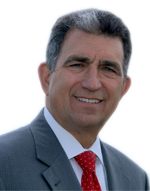Energy Bills Enforce New York’s Gas Tax Cap and Go after ‘Big Oil’ Windfall Profits
Package better protects consumers from rising prices
Assemblyman Bill Magnarelli (D-Syracuse) announced the Assembly introduced a package of energy-related bills designed to offset steadily rising and historically high fuel costs.
“Across Central New York rising gasoline and energy costs are squeezing family budgets and putting an enormous burden on businesses, schools and local governments,” Magnarelli said. “That’s why the Assembly is advancing a comprehensive package of legislation that will force major oil companies to pay up, enhance consumer protection and push for a national energy policy to combat the Bush administration’s failures.”
Forcing major oil companies to pay up
“In 2006, I voted for a law capping the state sales tax on gasoline at $2 per gallon – saving New York motorists more than $250 million a year, but you can’t tell New York State has saved drivers millions because ‘Big Oil’ is taking those savings back in ever higher profits,” Magnarelli said. “By 2009, ‘Big Oil’ will have soaked up $600 million in savings that was supposed to go to the consumer. This is flat-out wrong, and that’s why we have put forth this critical legislation to help ensure major oil companies can’t continue to get away with ‘highway’ robbery.”
Magnarelli noted that the sales tax cap measure was offered to local governments as an option and 15 counties enacted it, but eight, including Onondaga County, repealed the cap when it was evident the savings was not being passed on to motorists.
The Assembly’s legislation would institute a recapture and windfall-profit tax provision on “Big Oil” companies with a prohibition on passing the tax on to consumers (A.11590). The revenues would go to a fund that supports energy-savings measures for consumers as well as helping pay home heating bills this winter through the Home Energy Assistance Program (HEAP). The legislation:
- requires gasoline importers to pay a surcharge equal to 4 percent of the difference between the price of a gallon of gasoline and $2 per gallon; and
- prohibits the pass-through of this surcharge to consumers and provides for a civil penalty of up to $35,000 per day for any violation of this prohibition.
Based on the forecasted price for gasoline by the Energy Information Association, the recapture provision on “Big Oil” could generate up to $406 million. The windfall-profit tax would:
- impose a 2 percent gross-receipts tax on very large oil companies that sell their products in New York State, similar to the windfall-profit tax imposed on oil companies in the 1980s; and
- prohibit big oil companies from passing along the additional costs to customers through increases in the price of gasoline.
Based on gasoline price forecasts by the Energy Information Association, this windfall-profit tax could generate up to $464 million, Magnarelli said. This additional revenue would be dedicated to increasing the eligibility in the state’s Low Income HEAP and other energy conservation programs. Currently, the program only serves families making 60 percent of the state’s median income – $28,296 for a family of two or $41,616 for a family of four. The legislation will expand the income eligibility to 80 percent of the state’s median income – $37,728 for a family of two or $55,488 for a family of four.
According to the Office of Temporary Disability Assistance, eligible families can receive two $350 grants per season – an initial grant and one emergency grant. Magnarelli added that with oil prices over $135 per barrel and continuing to rise to all-time record highs, Central New York seniors and working families will need added this assistance to deal with potential skyrocketing home-heating costs this winter.
Enhancing consumer protection and efficiency
“It’s absolutely critical that we do everything we can to protect consumers from being taken advantage of,” Magnarelli said.
The package of energy bills includes legislation that will:
- ensure gasoline pumps dispense the accurate amount of fuel that a consumer is charged for by retailers, ending the phenomenon known as “pump jump” (A.11588);
- establish a Web site to inform consumers of current retail prices for all grades of gasoline and diesel fuel sold at retail outlets throughout New York State (A.11588);
- create a database, rating system and test procedures of replacement tires, helping consumers purchase the most energy-efficient tires for their cars (A.10262-B);
- allow gasoline retailers and distributors to purchase and sell unbranded motor fuel, giving consumers the option to purchase less expensive fuel (A.9073-B); and
- provide for fleet maintenance, fueling and driving regulations in order to reduce fuel consumed by New York State Office of General Services vehicles; require that all new light-duty vehicles purchased by state agencies – except for police and emergency vehicles – be alternative-fuel vehicles; and require state agencies to make cost-effective purchases of zero-emission or low-emission medium-duty vehicles (A.11589).
Pushing for a national energy policy to combat the Bush Administration failures
The Assembly also introduced resolutions calling for a federal solution to end the practice of price-gouging by companies that produce crude oil, gasoline, natural gas and all petroleum distillates. The resolution urges Congress to:
- create an excess-profits tax for companies that engage in gouging (K.1987);
- establish additional consumer tax credits to stimulate the creation of innovative, renewable energy technologies (K.1987); and
- provide additional funding for the Low Income Home Energy Assistance Program to better serve the families that rely on the program to help meet their energy needs (K.1986).
“Too many Central New Yorkers are struggling to pay their energy bills and to put gas in the car to get to work. This legislation will help alleviate some of the burden,” Magnarelli said. “I urge the Senate and the governor to pass these bills and sign them into law so we can provide relief to our families and businesses.”
